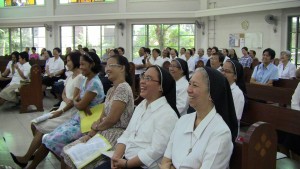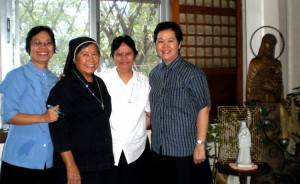(Delivered on January 29, 2014 for the Mass of the Resurrection for
Sr. Celeste of Mary, Mother of God Engutan, CGS, held at the Good Shepher Chapel, Quezon City)

I was caught by surprise by the question. At first I said, “I don’t think I can help you with that one.” From the disappointed look on her face, I knew I was 
But she was able to do it. This past Saturday evening at 7:15 pm she abandoned herself into the arms of her loving Shepherd God. But it was not easy.

The last 6 months were a struggle for her. She reexamined her life from every angle. She sought peace and reconciliation where it was needed. She recalled so much in her life for which she was so very thankful. She wrestled with many questions. For some of these question, she discovered answers. But regarding the unanswered questions, I am sure she had a list ready for the Lord upon her arrival at the pearly gates.
Cele had an inquisitive mind. She loved to study. During the days of her infirmary stay when she was feeling well, she would ask me for books to read. She asked me for books on sacraments, ministry, moral theology, etc. She told me that these were the areas she had not had much chance to study. She always wanted to know more.
Of course, her greatest interest was in the study of Sacred Scripture. She did formal studies (as we heard before the Mass). Sometimes, after a homily at Mass at the convent in Tagaytay, she would discuss the finer points of the day’s scripture readings over breakfast. But for her, this was not just an inquisitive academic exercise. Like St. Jerome, she found Jesus on every page of the Bible.
She would be pleased with today’s choice of readings, in particular, the second reading from the 2nd letter of Paul to Timothy. This letter has been referred by some scripture commentators as St. Paul’s last will and testament. He looks back on his life in service to the Lord and sums it up by saying: “I have fought the good fight, I have finished the race, I have kept the faith.”
Sr. Celeste herself used those verses many times in these last months to express her feelings. She knew she had done her best. She fought a good fight. She was about to finish the race. She kept the faith. Of course she had done this not only in the last weeks and months, but throughout her life. She had always been strong for her family. She was always a leader in her religious family, the Contemplatives of the Good Shepherd. She was an inspiration to younger sisters in formation and a trusted confidante to all who turned to her. She gave of herself unselfishly. You know, only few of us know how long our race will be, but she was given the grace to be able to see the finish line and sprint to the end. Yes, I think this was a grace: knowing that her days were numbered. The Lord gave her the grace to be able to spring to the finish line.
But really the Christian life is a marathon. Finishing a marathon well is not easy. It takes strength, it takes endurance, it takes determination. It takes strong motivation to finish a marathon and to finish it well. In our second reading, the apostle Paul seems to be crossing the finish line with energy to spare. It as if before he crosses the finish line, he jogs back to where Timothy seems to be losing steam and exhorts him to keep running well.
In our reading, it is clear that Paul is looking death in the face. He shares with the young Timothy what he has learned about living as a disciple and an apostle. His words must have caused Timothy to burst into tears when he first read them. And, these words must have impressed upon Timothy the reality that Paul had handed off the baton to him. Now, he had to finish well. That’s our challenge as Christians: to finish the race well.
Paul is teaching Timothy and US how to finish well:
1. St. Paul could finish well because he viewed his life as an offering to God.
Paul says: “I am being poured out like a libation” Other translations say: “a drink offering.” In the book of Numbers we read that after the sacrificial lamb had been placed on the altar, before the fire was lit under it, the priest would pour about a quart of wine on it.. [Celeste might object to such a use of good wine.]
This wine was the final offering added to the existing sacrifice. That is how Paul viewed his own death. His whole life had been a living sacrifice offered to God. Now his death was the libation (the final offering) added on top of his life of sacrifice.
Our Sister Celeste offered her whole life to God. Her manner of death was her final offering to God. And we too are reminded to view our lives as an offering to God. We do not serve the Lord for the recognition we get or for the satisfaction we feel, but rather as an offering, an act of worship to the Lord.
2. St. Paul could finish well because he viewed his impending death as a departure
Paul says: “The time of my departure has come.” The Greek word for departure that Paul used was a vivid one. It was used to describe removing the yoke of an animal who has been pulling a plow or cart. Death means the end of our labors and toils in this life. It was also used for loosening the chains of a prisoner. Death is a release from the bonds of this corruptible body. It was also used for loosening the ropes of a soldier’s tent. This suggests that at death, the battle is over, victory is won, and we are headed home.
Celeste went home on Saturday night. She was released from the body which had become such a cause of suffering for her.
So also if we have Paul’s view of death as departure, we will be able to finish without fear and even with anticipation, knowing that to depart is to be with Christ. In those words of St Paul to the Philippians that were a favorite quotation of St. John Eudes: “For to me, to live is Christ and to die is gain.”
3. Paul could finish well because he hoped to meet the Lord, the just judge
When we die, we meet the Lord. He is there waiting for us at the finish line. Yes, he is the Lord and righteous judge, but he is merciful and welcoming. We do not need to fear the judge. As Paul reminds us in the letter to the Romans: “there is now no condemnation for those who are in Christ Jesus.”
Rather, in death Jesus offers us life, a life that will never end, a life free of sorrow and pain. Jesus said to Martha: “whoever believes in me, even if she dies, will live, and everyone who lives and believes in me will never die. Do you believe this?”
Can we say today, along with Martha and Celeste: “Yes, Lord, I have come to believe that you are the Messiah, the Son of God, the one who is coming into the world..” We too can finish well if we believe that we will meet the Lord at the finish line. I am sure that Celeste saw her Lord waiting for her at the finish line. He was cheering her on as she made the final sprint.
4. Paul could finish well because he lived in view of the crown of righteousness that awaits me on that day
It is difficult to interpret what Paul means by “the crown of righteousness.” Is this a special reward given only to some believers who have lived especially righteous lives, but not to all? Or, is it the reward of eternal righteousness, given to all believers, who have already been justified by faith?
I would favor the latter interpretation. It is very consistent with what we read in the letter of James: “Blessed is anyone who endures temptation. Such a one has stood the test and will receive the crown of life that the Lord has promised to those who love him.”
“That day,” a term Paul uses frequently, refers to the day of victory, the day when we receive the great reward of our labors in this world. We believe that Celeste has now received that crown of righteousness.
And now like St. Paul, she encourages us to keep running, finish strong, finish well.
None of us knows how long our personal marathon will be. But of one thing I am sure: when we finish the race, waiting for each of us at finish line will be our Lord Jesus. And close by him cheering us on will be our parents, our loved ones, and friends who have gone before us. Among them will be Sr. Celeste with a big smile and encouraging words. Finish well!


